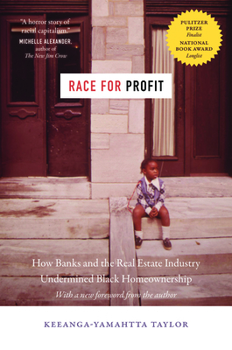Race for Profit: How Banks and the Real Estate Industry Undermined Black Homeownership
(Part of the Justice, Power, and Politics Series)
Select Format
Select Condition 
Book Overview
LONGLISTED FOR THE 2019 NATIONAL BOOK AWARD
FINALIST, 2020 PULITZER PRIZE IN HISTORY
By the late 1960s and early 1970s, reeling from a wave of urban uprisings, politicians finally worked to end the practice of redlining. Reasoning that the turbulence could be calmed by turning Black city-dwellers into homeowners, they passed the Housing and Urban Development Act of 1968, and set about establishing policies to induce mortgage lenders and the real estate industry to treat Black homebuyers equally. The disaster that ensued revealed that racist exclusion had not been eradicated, but rather transmuted into a new phenomenon of predatory inclusion.
Race for Profit uncovers how exploitative real estate practices continued well after housing discrimination was banned. The same racist structures and individuals remained intact after redlining's end, and close relationships between regulators and the industry created incentives to ignore improprieties. Meanwhile, new policies meant to encourage low-income homeownership created new methods to exploit Black homeowners. The federal government guaranteed urban mortgages in an attempt to overcome resistance to lending to Black buyers - as if unprofitability, rather than racism, was the cause of housing segregation. Bankers, investors, and real estate agents took advantage of the perverse incentives, targeting the Black women most likely to fail to keep up their home payments and slip into foreclosure, multiplying their profits. As a result, by the end of the 1970s, the nation's first programs to encourage Black homeownership ended with tens of thousands of foreclosures in Black communities across the country. The push to uplift Black homeownership had descended into a goldmine for realtors and mortgage lenders, and a ready-made cudgel for the champions of deregulation to wield against government intervention of any kind.
Narrating the story of a sea-change in housing policy and its dire impact on African Americans, Race for Profit reveals how the urban core was transformed into a new frontier of cynical extraction.
FINALIST, 2020 PULITZER PRIZE IN HISTORY
By the late 1960s and early 1970s, reeling from a wave of urban uprisings, politicians finally worked to end the practice of redlining. Reasoning that the turbulence could be calmed by turning Black city-dwellers into homeowners, they passed the Housing and Urban Development Act of 1968, and set about establishing policies to induce mortgage lenders and the real estate industry to treat Black homebuyers equally. The disaster that ensued revealed that racist exclusion had not been eradicated, but rather transmuted into a new phenomenon of predatory inclusion.
Race for Profit uncovers how exploitative real estate practices continued well after housing discrimination was banned. The same racist structures and individuals remained intact after redlining's end, and close relationships between regulators and the industry created incentives to ignore improprieties. Meanwhile, new policies meant to encourage low-income homeownership created new methods to exploit Black homeowners. The federal government guaranteed urban mortgages in an attempt to overcome resistance to lending to Black buyers - as if unprofitability, rather than racism, was the cause of housing segregation. Bankers, investors, and real estate agents took advantage of the perverse incentives, targeting the Black women most likely to fail to keep up their home payments and slip into foreclosure, multiplying their profits. As a result, by the end of the 1970s, the nation's first programs to encourage Black homeownership ended with tens of thousands of foreclosures in Black communities across the country. The push to uplift Black homeownership had descended into a goldmine for realtors and mortgage lenders, and a ready-made cudgel for the champions of deregulation to wield against government intervention of any kind.
Narrating the story of a sea-change in housing policy and its dire impact on African Americans, Race for Profit reveals how the urban core was transformed into a new frontier of cynical extraction.
Format:Paperback
Language:English
ISBN:1469663880
ISBN13:9781469663883
Release Date:April 2021
Publisher:University of North Carolina Press
Length:368 Pages
Weight:1.17 lbs.
Dimensions:0.9" x 6.1" x 9.2"
Customer Reviews
1 rating
A Must Read! Couldn't Put It Down
Published by MxGrace , 2 years ago
Wow.
Buckle up because I could not put this book down. I have a low tolerance for boring subjects so I wasn't too sure about this book, but it's an important topic so I decided to read it. I was CAPTIVATED. The author makes the most mundane sound interesting, and does an excellence job of compiling vast amounts of research and data in a reader friendly format. I've never finished a semester of university and I understood this book perfectly. In my opinion this should be read in high school government classes, required reading.
If you're my friend, you probably wouldn't be saying "why are you bringing race into this", but in case you have no clue, because it matters. And educating yourself is vital to understanding your fellow humans. I learned SO much and was shocked by so much, all of which I had no knowledge of. I was born in the US, and have spent collectively close to 2 decades here. My educational materials for all of my school years were from the US. I NEVER learned this history. I will never suffer anyone who claims the struggles of being Black in the US is "ancient history" ever again. This book singlehandedly gave me all the exact data I need to refute that statement as either pure ignorance, or malicious racism.
I'm writing too much at this point, but suffice to say, this book is a gold mine. If you are not Black, you need to read this. It is important that we understand what the Black community has been subjected to in order to be a good neighbor to them. I marched in the streets for a murdered man, but these marches started so long ago and have a long way to go yet!






